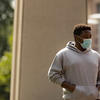The latest information on the spread of the coronavirus illness is available from the Centers for Disease Control and Prevention (CDC). The World Health Organization is also tracking the disease and offers advice for travelers.
Temple Hospital has a COVID-19 hotline available at 215-707-6999. The Philadelphia Health Department Helpline can be reached at 800-722-7112. Only use 911 if you are experiencing a true medical emergency.
We will keep you updated on any significant changes that would impact plans by members of the Temple community.

